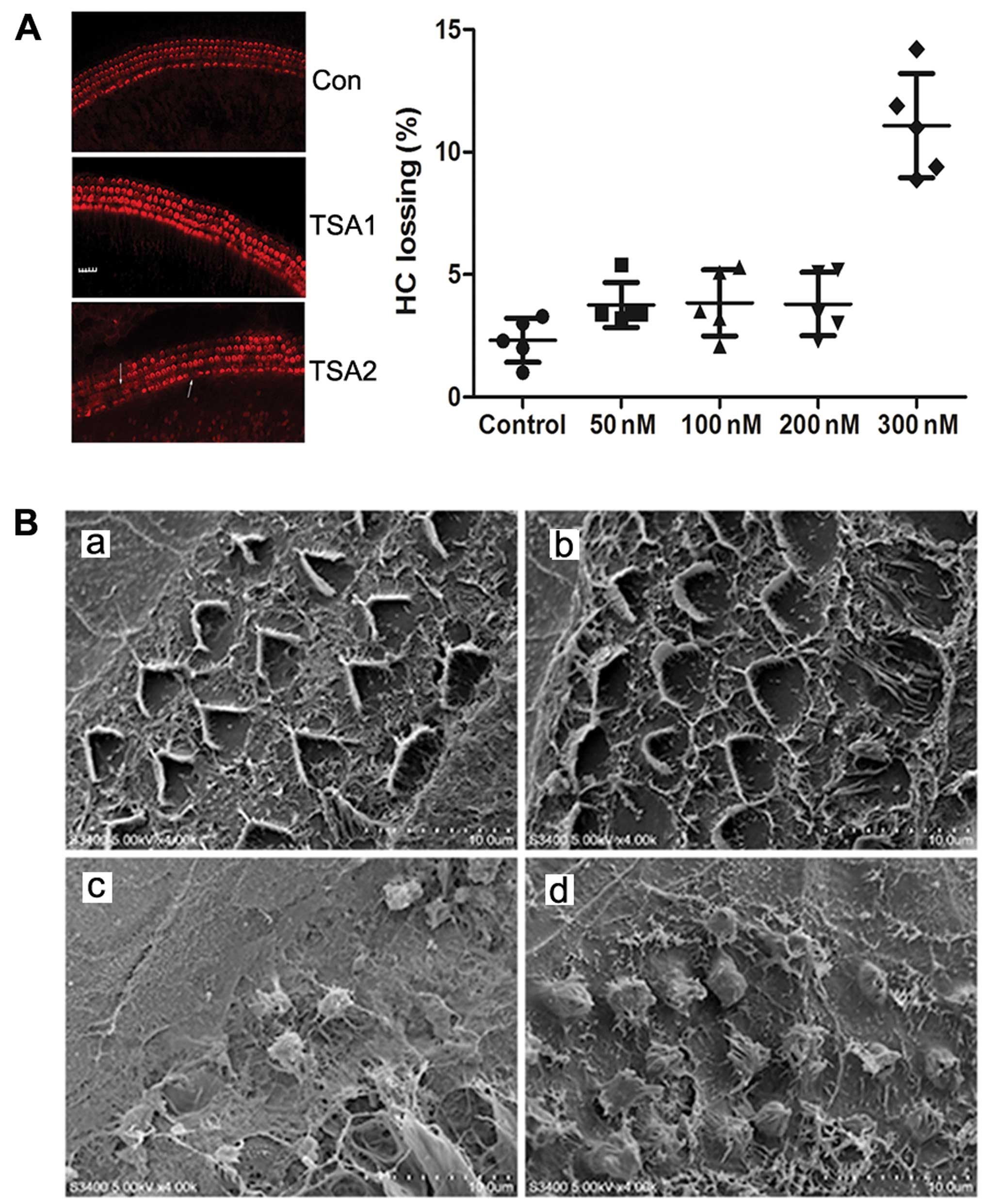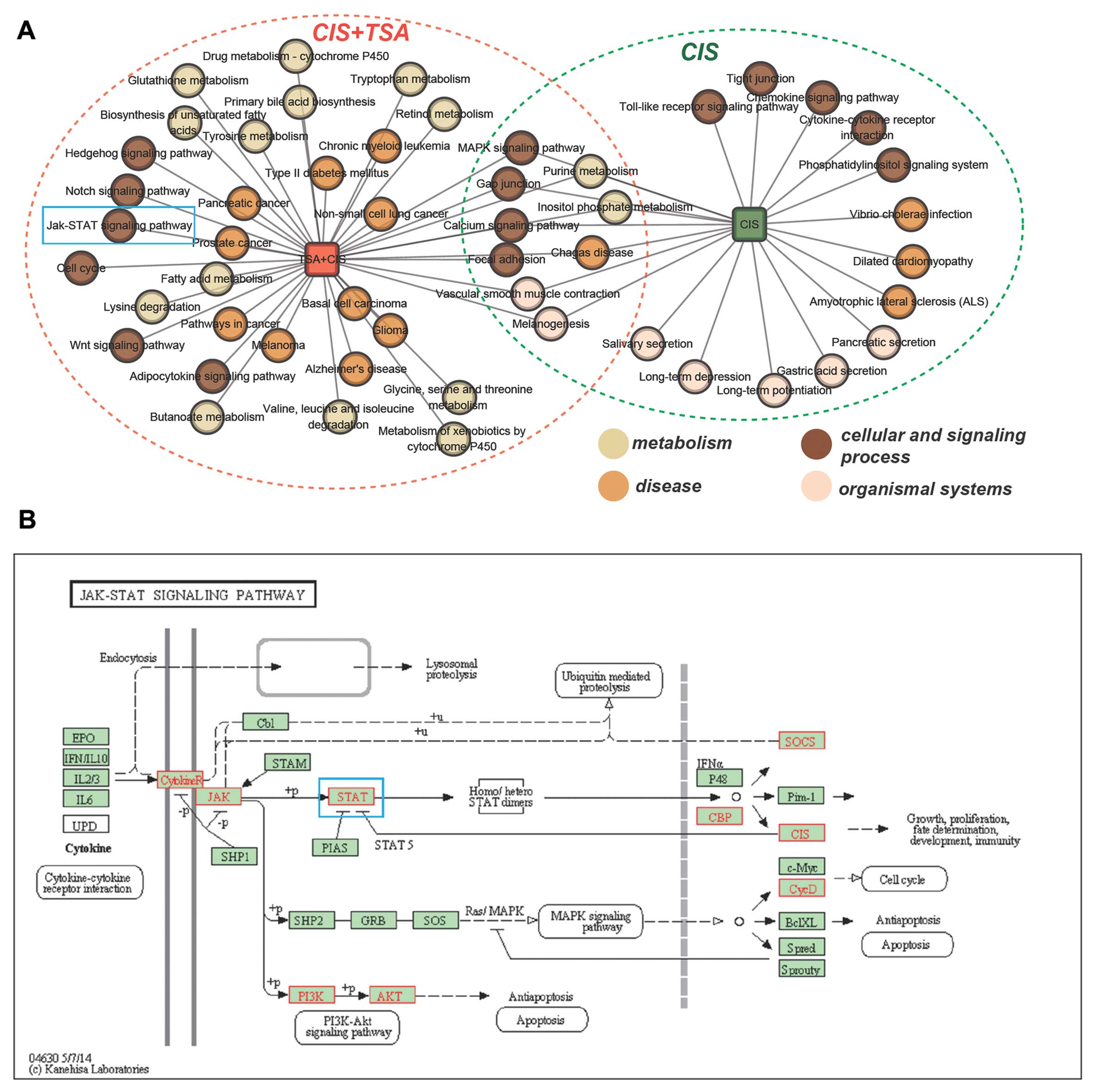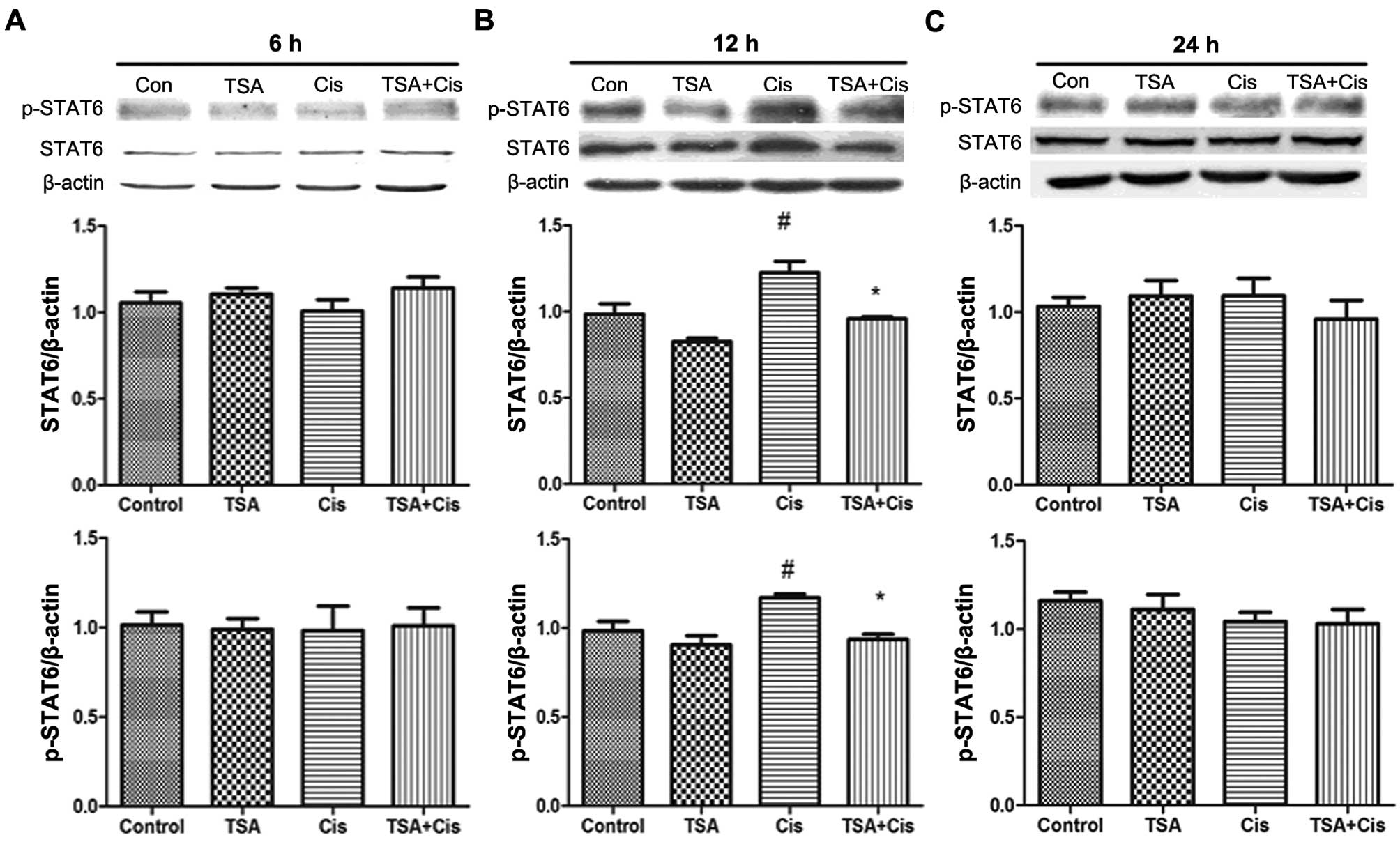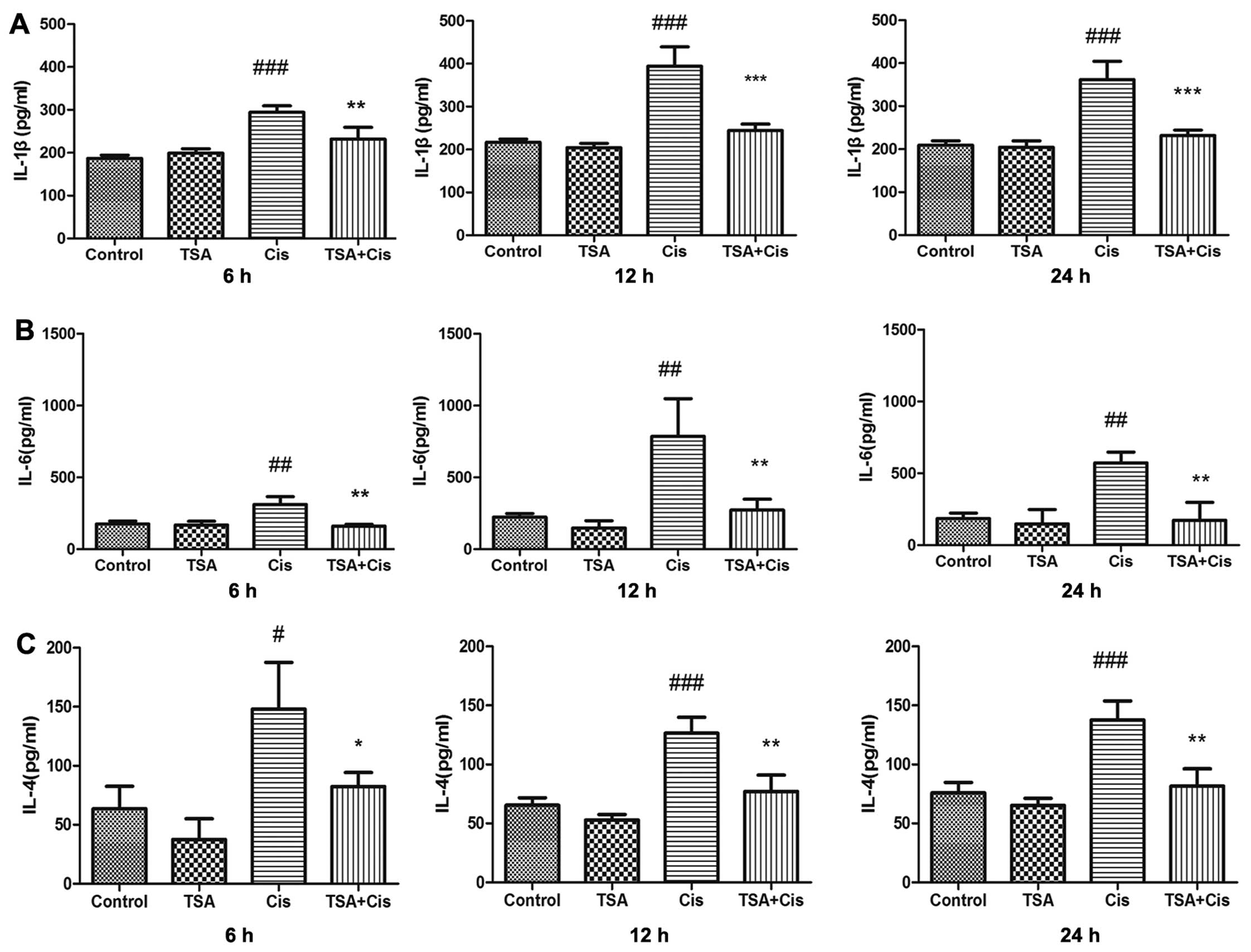|
1
|
Dasari S and Tchounwou PB: Cisplatin in
cancer therapy: Molecular mechanisms of action. Eur J Pharmacol.
740:364–378. 2014. View Article : Google Scholar : PubMed/NCBI
|
|
2
|
Barabas K, Milner R, Lurie D and Adin C:
Cisplatin: A review of toxicities and therapeutic applications. Vet
Comp Oncol. 6:1–18. 2008. View Article : Google Scholar
|
|
3
|
Rybak LP, Mukherjea D, Jajoo S and
Ramkumar V: Cisplatin ototoxicity and protection: Clinical and
experimental studies. Tohoku J Exp Med. 219:177–186. 2009.
View Article : Google Scholar : PubMed/NCBI
|
|
4
|
Sakamoto M, Kaga K and Kamio T: Extended
high-frequency ototoxicity induced by the first administration of
cisplatin. Otolaryngol Head Neck Surg. 122:828–833. 2000.
View Article : Google Scholar : PubMed/NCBI
|
|
5
|
Rybak LP: Mechanisms of cisplatin
ototoxicity and progress in otoprotection. Curr Opin Otolaryngol
Head Neck Surg. 15:364–369. 2007. View Article : Google Scholar : PubMed/NCBI
|
|
6
|
So H, Kim H, Lee JH, Park C, Kim Y, Kim E,
Kim JK, Yun KJ, Lee KM, Lee HY, et al: Cisplatin cytotoxicity of
auditory cells requires secretions of proinflammatory cytokines via
activation of ERK and NF-kappaB. J Assoc Res Otolaryngol.
8:338–355. 2007. View Article : Google Scholar : PubMed/NCBI
|
|
7
|
Zhou BR, Zhang JA, Zhang Q, Permatasari F,
Xu Y, Wu D, Yin ZQ and Luo D: Palmitic acid induces production of
proinflammatory cytokines interleukin-6, interleukin-1β, and tumor
necrosis factor-α via a NF-κB-dependent mechanism in HaCaT
keratinocytes. Mediators Inflamm. 2013:5304292013. View Article : Google Scholar
|
|
8
|
Aittomäki S and Pesu M: Therapeutic
targeting of the Jak/STAT pathway. Basic Clin Pharmacol Toxicol.
114:18–23. 2014. View Article : Google Scholar
|
|
9
|
O’Shea JJ and Plenge R: JAK and STAT
signaling molecules in immunoregulation and immune-mediated
disease. Immunity. 36:542–550. 2012. View Article : Google Scholar
|
|
10
|
Kiu H and Nicholson SE: Biology and
significance of the JAK/STAT signalling pathways. Growth Factors.
30:88–106. 2012. View Article : Google Scholar : PubMed/NCBI
|
|
11
|
Kim HJ, Oh GS, Lee JH, Lyu AR, Ji HM, Lee
SH, Song J, Park SJ, You YO, Sul JD, et al: Cisplatin ototoxicity
involves cytokines and STAT6 signaling network. Cell Res.
21:944–956. 2011. View Article : Google Scholar : PubMed/NCBI
|
|
12
|
Grabiec AM, Tak PP and Reedquist KA:
Targeting histone deacetylase activity in rheumatoid arthritis and
asthma as prototypes of inflammatory disease: Should we keep our
HATs on? Arthritis Res Ther. 10:2262008. View Article : Google Scholar : PubMed/NCBI
|
|
13
|
Chen FQ, Schacht J and Sha SH:
Aminoglycoside-induced histone deacetylation and hair cell death in
the mouse cochlea. J Neurochem. 108:1226–1236. 2009. View Article : Google Scholar : PubMed/NCBI
|
|
14
|
Cunningham LL and Brandon CS: Heat shock
inhibits both aminoglycoside- and cisplatin-induced sensory hair
cell death. J Assoc Res Otolaryngol. 7:299–307. 2006. View Article : Google Scholar : PubMed/NCBI
|
|
15
|
Wang P, Zhang P, Huang J, Li M and Chen X:
Trichostatin A protects against cisplatin-induced ototoxicity by
regulating expression of genes related to apoptosis and synaptic
function. Neurotoxicology. 37:51–62. 2013. View Article : Google Scholar : PubMed/NCBI
|
|
16
|
Han SB and Lee JK: Anti-inflammatory
effect of Trichostatin-A on murine bone marrow-derived macrophages.
Arch Pharm Res. 32:613–624. 2009. View Article : Google Scholar : PubMed/NCBI
|
|
17
|
Kim HJ, Rowe M, Ren M, Hong JS, Chen PS
and Chuang DM: Histone deacetylase inhibitors exhibit
anti-inflammatory and neuroprotective effects in a rat permanent
ischemic model of stroke: multiple mechanisms of action. J
Pharmacol Exp Ther. 321:892–901. 2007. View Article : Google Scholar : PubMed/NCBI
|
|
18
|
Li C, Li X, Miao Y, Wang Q, Jiang W, Xu C,
Li J, Han J, Zhang F, Gong B and Xu L: SubpathwayMiner: A software
package for flexible identification of pathways. Nucleic Acids Res.
37:e1312009. View Article : Google Scholar : PubMed/NCBI
|
|
19
|
Zheng JL and Gao WQ: Differential damage
to auditory neurons and hair cells by ototoxins and neuroprotection
by specific neurotrophins in rat cochlear organotypic cultures. Eur
J Neurosci. 8:1897–1905. 1996. View Article : Google Scholar : PubMed/NCBI
|
|
20
|
Segawa A, Loffredo F, Puxeddu R, Yamashina
S, Testa Riva F and Riva A: Exocytosis in human salivary glands
visualized by high-resolution scanning electron microscopy. Cell
Tissue Res. 291:325–336. 1998. View Article : Google Scholar : PubMed/NCBI
|
|
21
|
Hamers FP, Wijbenga J, Wolters FL, Klis
SF, Sluyter S and Smoorenburg GF: Cisplatin ototoxicity involves
organ of Corti, stria vascularis and spiral ganglion: Modulation by
alphaMSH and ORG 2766. Audiol Neurootol. 8:305–315. 2003.
View Article : Google Scholar : PubMed/NCBI
|
|
22
|
Xiong H, Du W, Zhang YJ, Hong J, Su WY,
Tang JT, Wang YC, Lu R, Fang JY and Trichostatin A: Trichostatin A,
a histone deacetylase inhibitor, suppresses JAK2/STAT3 signaling
via inducing the promoter-associated histone acetylation of SOCS1
and SOCS3 in human colorectal cancer cells. Mol Carcinog.
51:174–184. 2012. View
Article : Google Scholar
|
|
23
|
Kim J, Cho HJ, Sagong B, Kim SJ, Lee JT,
So HS, Lee IK, Kim UK, Lee KY and Choo YS: Alpha-lipoic acid
protects against cisplatin-induced ototoxicity via the regulation
of MAPKs and proinflammatory cytokines. Biochem Biophys Res Commun.
449:183–189. 2014. View Article : Google Scholar : PubMed/NCBI
|
|
24
|
Kaur T, Mukherjea D, Sheehan K, Jajoo S,
Rybak LP and Ramkumar V: Short interfering RNA against STAT1
attenuates cisplatin-induced ototoxicity in the rat by suppressing
inflammation. Cell Death Dis. 2:e1802011. View Article : Google Scholar : PubMed/NCBI
|
|
25
|
Mukherjea D, Jajoo S, Sheehan K, Kaur T,
Sheth S, Bunch J, Perro C, Rybak LP and Ramkumar V: NOX3 NADPH
oxidase couples transient receptor potential vanilloid 1 to signal
transducer and activator of transcription 1-mediated inflammation
and hearing loss. Antioxid Redox Signal. 14:999–1010. 2011.
View Article : Google Scholar :
|
|
26
|
Abi-Hachem RN, Zine A and Van De Water TR:
The injured cochlea as a target for inflammatory processes,
initiation of cell death pathways and application of related
otoprotectives strategies. Recent Patents CNS Drug Discov.
5:147–163. 2010. View Article : Google Scholar
|
|
27
|
So H, Kim H, Kim Y, Kim E, Pae HO, Chung
HT, Kim HJ, Kwon KB, Lee KM, Lee HY, et al: Evidence that
cisplatin-induced auditory damage is attenuated by downregulation
of pro-inflammatory cytokines via Nrf2/HO-1. J Assoc Res
Otolaryngol. 9:290–306. 2008. View Article : Google Scholar : PubMed/NCBI
|
|
28
|
Kopke R, Allen KA, Henderson D, Hoffer M,
Frenz D and Van de Water T: A radical demise. Toxins and trauma
share common pathways in hair cell death. Ann NY Acad Sci.
884:171–191. 1999. View Article : Google Scholar
|
|
29
|
Ma C, Billings P, Harris JP and Keithley
EM: Characterization of an experimentally induced inner ear immune
response. Laryngoscope. 110:451–456. 2000. View Article : Google Scholar : PubMed/NCBI
|
|
30
|
Rahman MU, Poe DS and Choi HK: Autoimmune
vestibulo-cochlear disorders. Curr Opin Rheumatol. 13:184–189.
2001. View Article : Google Scholar : PubMed/NCBI
|
|
31
|
Ryan AF, Harris JP and Keithley EM:
Immune-mediated hearing loss: Basic mechanisms and options for
therapy. Acta Otolaryngol Suppl. 122:38–43. 2002. View Article : Google Scholar
|
|
32
|
Stone JH and Francis HW: Immune-mediated
inner ear disease. Curr Opin Rheumatol. 12:32–40. 2000. View Article : Google Scholar : PubMed/NCBI
|
|
33
|
Fujioka M, Kanzaki S, Okano HJ, Masuda M,
Ogawa K and Okano H: Proinflammatory cytokines expression in
noise-induced damaged cochlea. J Neurosci Res. 83:575–583. 2006.
View Article : Google Scholar : PubMed/NCBI
|
|
34
|
Drottar M, Liberman MC, Ratan RR and
Roberson DW: The histone deacetylase inhibitor sodium butyrate
protects against cisplatin-induced hearing loss in guinea pigs.
Laryngoscope. 116:292–296. 2006. View Article : Google Scholar : PubMed/NCBI
|
|
35
|
Schacht J, Talaska AE and Rybak LP:
Cisplatin and aminoglycoside antibiotics: Hearing loss and its
prevention. Anat Rec (Hoboken). 295:1837–1850. 2012. View Article : Google Scholar
|
|
36
|
Toussirot E, Abbas W, Khan KA, Tissot M,
Jeudy A, Baud L, Bertolini E, Wendling D and Herbein G: Imbalance
between HAT and HDAC activities in the PBMCs of patients with
anky-losing spondylitis orrheumatoid arthritis and influence of
HDAC inhibitors on TNF alpha production. PLoS One. 8:e709392013.
View Article : Google Scholar
|


















